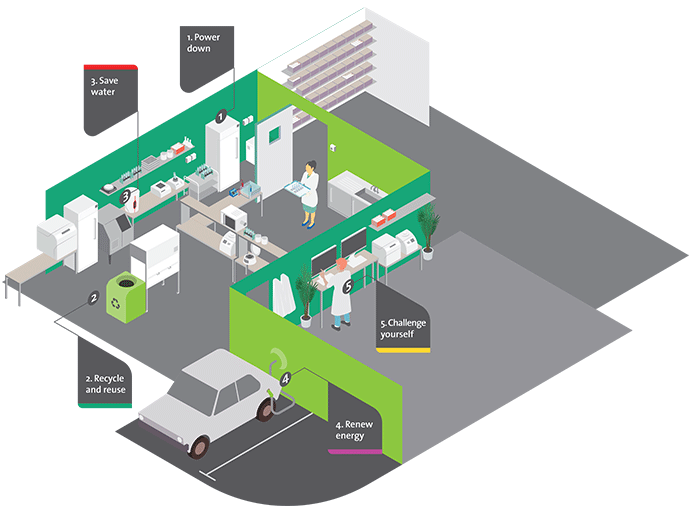Top 10 Tips for Running a Greener Lab
13 Feb 2020
Careful use of your research tools and equipment can minimize your environmental footprint and save you money. Make your lab a little greener today by following these simple tips-
Sustainable Science Needn't Cost the World
The annual energy use of life science research labs is estimated to be around three to four times that of a typical commercial building. While life science research has the potential to improve the lives of billions through the discovery of new tools, technologies and treatments, it’s also resource intensive. So while it may seem counter-intuitive, scientific progress also comes at a cost to society and the environment. How can we work to maximize the benefit while minimizing the environmental impact?
The truth is, much of this energy consumption can’t be avoided – it is the cost of doing good science. However, there are many opportunities to improve your lab practices and make your work ‘greener,’ without taking up valuable time or over-stretching your research funding.
In fact, making your lab more eco-friendly can actually save you money in the long run. For example, closing or switching off fume hoods when not in use can save up to £2,000 per year per hood. The reduction in background noise levels can also help to encourage conversation between you and your colleagues (although we realize that there could be both pros and cons to this!).
Make Every Experiment a Green Experiment
Purified water is the ever-present reagent used by most experiments in the lab. By optimizing how you use and store it, you can make nearly every study you carry out more environmentally friendly. Consider the following:
- Use the right level of purity. After all, are you washing glassware, preparing media or carrying out HPLC? Not every application needs Type 1+ ultrapure water – learn which level of purity you need here.
- Select purification systems with low energy consumption components and power-saving features that shut down when not in use.
- Minimize environmental impact by using consumables such as filters and deionization cartridges that have been designed to be recycled.
- Waste as little water as possible – store excess water using intermittent recirculation tanks that keep the water pure without using a large amount of energy.
- If you are still using energy-gobbling water stills, it may be time to switch to the newest generation water purification systems to save on energy bills and reduce environmental impact.
10 More Ways You Can Save Energy (and Money):
- Turn off the lights (when you’re not in the room, of course).
- Switch off unused equipment.
- Organize your -80°C freezer better – whenever you have to dig around looking for samples you leave the door open. This increases the temperature inside, which takes energy to rectify once the door is closed again.
- Empty your freezers and fridges – while we’re in the freezer (or fridge), are there any samples or reagents you can safely store at room temperature (or even throw away)? This could free up space and reduce the number of storage units you need.
- Reduce your transport footprint by planning ahead and consolidating all of your orders with each supplier into one shipment where possible.
- Recycle – glass, plastic and paper are just some of the things that can be recycled in the lab. Make sure you have plenty of well-labeled recycle bins around.
- Select greener products and equipment – Many companies now offer environmentally-conscious kits and equipment, housed in recyclable packaging and produced using sustainable practices. If you can, buy from these companies.
- Swap hazardous chemicals for more friendly alternatives – MIT offers an online ‘Green Chemical Alternative Wizard’ database, helping you to swap dangerous chemicals (which are usually more difficult to safely produce, transport and store, and therefore more expensive) for friendlier, often cheaper, alternatives.
- Run a green office – the modern scientist spends nearly as much time on their computer as at their bench these days, so be sure to apply these green principles in both your lab and your office space. The easiest win is to set your computer to sleep whenever you are away for more than 5 minutes at a time, but there are plenty more.
- Revisit your green practices from time to time. Running a green lab is an ongoing process. Stay on top of latest developments in lab equipment and reagents – maybe these new tools could further reduce your environmental footprint and save you money and time in the future.

